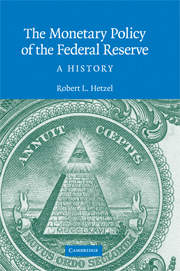Book contents
- Frontmatter
- Contents
- Figures
- Preface
- 1 The Pragmatic Evolution of the Monetary Standard
- 2 Learning and Policy Ambiguity
- 3 From Gold to Fiat Money
- 4 From World War II to the Accord
- 5 Martin and Lean-against-the-Wind
- 6 Inflation Is a Nonmonetary Phenomenon
- 7 The Start of the Great Inflation
- 8 Arthur Burns and Richard Nixon
- 9 Bretton Woods
- 10 Policy in the Ford Administration
- 11 Carter, Burns, and Miller
- 12 The Political Economy of Inflation
- 13 The Volcker Disinflation
- 14 Monetary Policy after the Disinflation
- 15 Greenspan's Move to Price Stability
- 16 International Bailouts and Moral Hazard
- 17 Monetary Policy Becomes Expansionary
- 18 Departing from the Standard Procedures
- 19 Boom and Bust: 1997 to 2001
- 20 Backing Off from Price Stability
- 21 The Volcker–Greenspan Regime
- 22 The Fed: Inflation Fighter or Inflation Creator?
- 23 The Stop–Go Laboratory
- 24 Stop–Go and Interest Rate Inertia
- 25 Monetary Nonneutrality in the Stop–Go Era
- 26 A Century of Monetary Experiments
- Appendix: Data Seen by FOMC for the Stop–Go Period Shown in Figures 24.1, 24.2, and 24.3
- Notes
- Bibliography
- Index
- Titles in the series
23 - The Stop–Go Laboratory
Published online by Cambridge University Press: 26 May 2010
- Frontmatter
- Contents
- Figures
- Preface
- 1 The Pragmatic Evolution of the Monetary Standard
- 2 Learning and Policy Ambiguity
- 3 From Gold to Fiat Money
- 4 From World War II to the Accord
- 5 Martin and Lean-against-the-Wind
- 6 Inflation Is a Nonmonetary Phenomenon
- 7 The Start of the Great Inflation
- 8 Arthur Burns and Richard Nixon
- 9 Bretton Woods
- 10 Policy in the Ford Administration
- 11 Carter, Burns, and Miller
- 12 The Political Economy of Inflation
- 13 The Volcker Disinflation
- 14 Monetary Policy after the Disinflation
- 15 Greenspan's Move to Price Stability
- 16 International Bailouts and Moral Hazard
- 17 Monetary Policy Becomes Expansionary
- 18 Departing from the Standard Procedures
- 19 Boom and Bust: 1997 to 2001
- 20 Backing Off from Price Stability
- 21 The Volcker–Greenspan Regime
- 22 The Fed: Inflation Fighter or Inflation Creator?
- 23 The Stop–Go Laboratory
- 24 Stop–Go and Interest Rate Inertia
- 25 Monetary Nonneutrality in the Stop–Go Era
- 26 A Century of Monetary Experiments
- Appendix: Data Seen by FOMC for the Stop–Go Period Shown in Figures 24.1, 24.2, and 24.3
- Notes
- Bibliography
- Index
- Titles in the series
Summary
The Woodrow Wilson Presidential Library in Staunton, VA, contains an exhibit entitled “The Federal Reserve: Wilson's Enduring Legacy: A modern industrial nation must have a money supply that can expand and contract with the economic cycle.” There is a quotation from a 1913 address by Wilson to Congress: “We must have a currency, not rigid as now, but readily, elastically responsive to sound credit. … And the control of the system of banking must be public, not private, must be vested in the government itself” [italics added]. The aggregate demand management of stop–go imparted the same procyclical bias to money that had existed under the real bills doctrine. However, it did so with an inflationary bias.
Chapters 23–5 identify the empirical regularities that characterize the almost 20-year stop–go period following 1964. The Fed, not private markets, produced “inflation shocks.” Inflation is a monetary phenomenon in that high rates of money growth preceded increases in inflation. Contrary to Taylor (1999), the inertia in the interest rate that made monetary policy inflationary preceded inflation rather than followed it.
To use historical experience to decide between the competing hypotheses of Fed as inflation creator and inflation fighter (Chapter 22), one needs to understand how the monetary regime affects the predictive relationship between money and prices. In case 1, the central bank accepts responsibility for inflation, possesses credibility for its inflation target, and pursues a strategy consistent with achieving the target.
- Type
- Chapter
- Information
- The Monetary Policy of the Federal ReserveA History, pp. 280 - 286Publisher: Cambridge University PressPrint publication year: 2008

